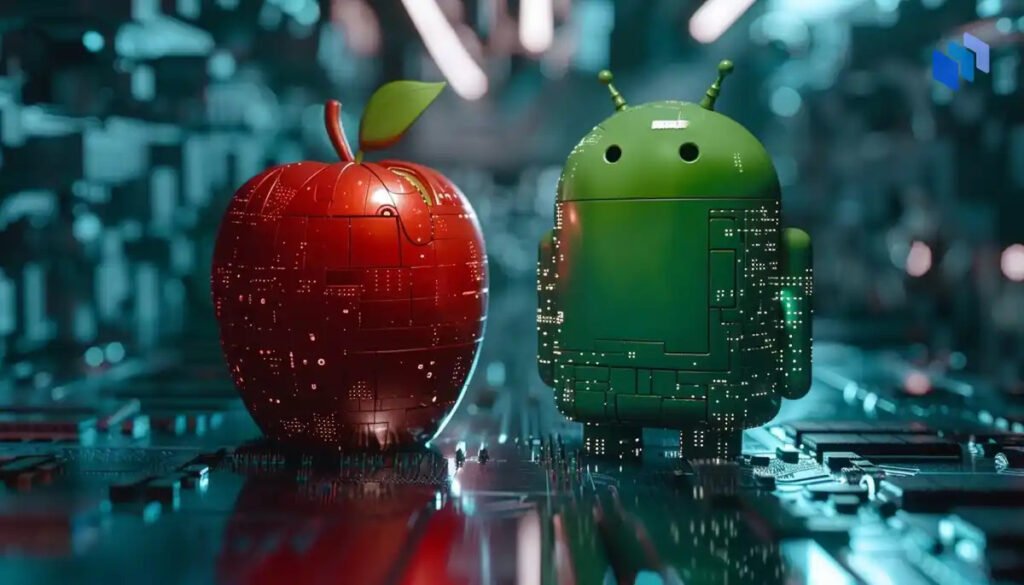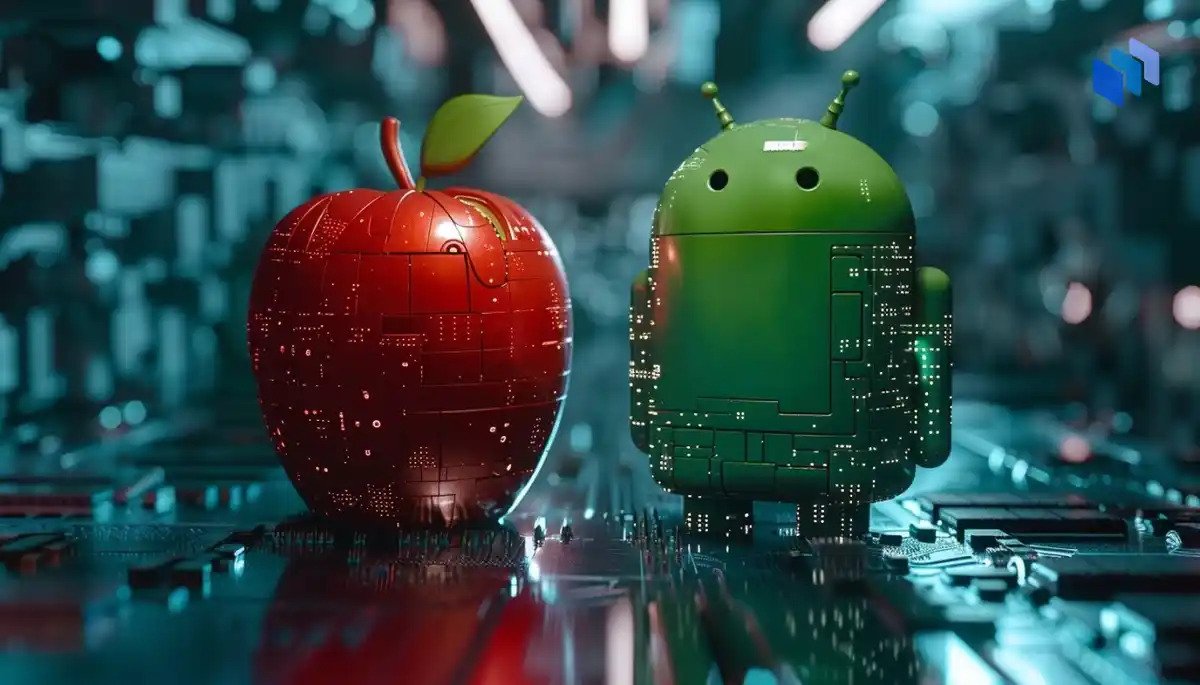Apple vs Android IN 2024: Which Ecosystem is Right for You?
The long-running argument between Apple and Android over smartphones and other digital devices still causes division among tech aficionados all around the world. Knowing which ecosystem is best for you can have a big impact on your user experience, whether you’re looking to buy a new tablet, smartphone, or wristwatch.
We’ll examine the Apple vs. Android controversy in detail in this extensive guide, contrasting their devices, features, applications, and ecosystems to assist you in selecting the platform that best meets your requirements. You will have the knowledge necessary to make an informed choice by the time you finish reading this essay. If you find the perfect fit, we’ll also include affiliate links to some of the best gadgets from both ecosystems so you can shop more easily.

1. Apple vs. Android: A Brief Overview
Before diving into the specifics, let’s take a quick look at what each ecosystem offers:
Apple Ecosystem: Built around seamless integration, Apple’s ecosystem includes products like the iPhone, iPad, MacBook, Apple Watch, AirPods, and Apple TV. The ecosystem thrives on the iOS and macOS platforms, offering a tightly controlled and cohesive user experience.
Android Ecosystem: Android, on the other hand, is an open-source operating system that powers devices from multiple manufacturers like Samsung, Google, OnePlus, and Sony. This diversity offers a wide range of devices and customization options, making Android a more flexible ecosystem.
Explore Apple Gadgets:
Explore Android Gadgets:
2. Design and Build Quality
When it comes to design, Apple is renowned for its premium, minimalist aesthetics. Apple’s devices are typically made from high-quality materials like aluminum and glass, giving them a luxurious feel.
Apple Design Pros:
- Premium Build: Apple’s design language focuses on elegance, with sleek lines and a uniform design across all its devices.
- Longevity: Apple products are known for their durability and longevity, which contributes to their high resale value.
Popular Apple Devices:
- iPhone 15 Pro Max: Known for its stunning Super Retina XDR display.
- MacBook Pro: Famous for its slim profile and robust build.
Android Design Pros:
- Variety of Options: Android devices come in a wide range of designs, from the premium feel of Samsung’s Galaxy S series to the more rugged and functional designs of brands like Sony and OnePlus.
- Customization: Many Android manufacturers offer unique design elements like curved screens, under-display fingerprint sensors, and customizable back covers.
Popular Android Devices:
- Samsung Galaxy S24 Ultra: Features a vibrant Dynamic AMOLED display.
- Google Pixel 8 Pro: Known for its excellent camera performance.
Verdict:
- If you prefer a premium and consistent design, Apple is the way to go.
- If you’re looking for variety and customization, Android has more to offer.
3. Operating Systems: iOS vs. Android
The core of any gadget is its operating system. Apple’s iOS and Google’s Android are the most popular operating systems globally, each with its own set of strengths.
iOS:
- User-Friendly Interface: Apple’s iOS is known for its smooth, intuitive, and user-friendly experience.
- Regular Updates: Apple provides software updates for all its devices simultaneously, ensuring better security and feature enhancements.
- App Store: The Apple App Store is highly curated, which means apps undergo a rigorous review process, ensuring safety and quality.
Android:
- Customization: Android offers extensive customization options, from home screen widgets to third-party app launchers, making it highly adaptable to individual preferences.
- Google Integration: Android integrates seamlessly with Google’s services, making it an excellent choice for those who rely heavily on Google apps like Gmail, Google Drive, and Google Photos.
- App Availability: The Google Play Store has a larger variety of apps, especially free ones, compared to the Apple App Store.
Verdict:
- Choose iOS for a polished, secure, and consistent experience.
- Opt for Android if you want flexibility, customization, and a wider range of apps.
4. Hardware and Device Options
Apple Hardware:
Apple maintains complete control over its hardware, resulting in optimized performance across its devices.
Key Apple Devices:
- iPhone 15 Pro Max: Latest flagship smartphone with A17 Bionic chip.
- Apple Watch Series 9: Best-in-class smartwatch for fitness and notifications.
- iPad Pro: A powerhouse tablet with M2 chip for productivity.
Shop Apple Watch Series 9 on Amazon
Android Hardware:
Android devices come in a wide range of options, from budget-friendly models to high-end flagships.
Key Android Devices:
- Samsung Galaxy Z Fold 6: Foldable phone that doubles as a tablet.
- OnePlus 12 Pro: Known for its fast charging and Fluid AMOLED display.
- Google Pixel Watch: Android’s answer to the Apple Watch with Wear OS.
Verdict:
- Choose Apple if you prefer a streamlined experience with optimized hardware and software integration.
- Go for Android if you want diverse hardware choices that cater to different budgets and preferences.
5. App Ecosystem
Apple App Store:
- Quality over Quantity: The App Store focuses on high-quality apps and games, ensuring a safer environment.
- Exclusive Apps: Some apps and games are exclusive to the iOS platform, including early access to popular games.
Google Play Store:
- Larger Library: With over 3 million apps, the Google Play Store offers a broader range of apps.
- Freedom for Developers: The open nature of the Play Store allows developers to publish apps more freely, resulting in more variety.
Verdict:
- Apple offers a secure, curated app experience.
- Android provides a vast selection and more free apps.
6. Customization and User Experience
Apple iOS:
- Limited customization but offers a clean and user-friendly experience.
- Focuses on consistency across all devices.
Android:
- Offers extensive customization, from widgets to custom ROMs.
- Perfect for users who enjoy personalizing their devices.
Verdict:
- Choose iOS if you value simplicity and consistency.
- Opt for Android if customization and flexibility are important to you.
7. Security and Privacy
Apple’s Approach:
- Known for its commitment to user privacy.
- Features like Face ID, Touch ID, and iCloud encryption offer robust security.
Android’s Approach:
- Android has made significant strides in security, but the open nature of the platform can make it more susceptible to malware.
- Google Play Protect offers built-in malware protection.
Verdict:
- Apple is the go-to choice for privacy-focused users.
- Android offers decent security but requires users to be more vigilant.
8. Integration with Other Devices
Apple Ecosystem:
- Seamless integration across all Apple devices.
- Features like AirDrop, Handoff, and iMessage enhance connectivity.
Android Ecosystem:
- Offers integration with Google services and other smart devices, but not as seamless as Apple.
- Compatible with a wide range of third-party devices.
Verdict:
- Apple excels in ecosystem integration.
- Android is better for diverse smart device compatibility.
9. Price Comparison
Apple:
- Generally more expensive with a premium price tag.
- High resale value.
Android:
- Offers a wider range of prices, from budget-friendly to premium devices.
Verdict:
- Apple for those willing to invest in a premium experience.
- Android for more budget-friendly options.
10. Which is Best for You?
Choose Apple if You:
- Prefer a seamless, intuitive user experience.
- Value privacy and security.
- Want high-quality, premium devices.
Choose Android if You:
- Enjoy customizing your device.
- Want more hardware options.
- Are looking for a budget-friendly option.
11. Final Verdict
Both Apple and Android ecosystems have their strengths and weaknesses. Apple offers a more integrated and secure experience, perfect for users who value privacy and premium design. On the other hand, Android provides flexibility, customization, and diverse hardware options, making it ideal for users who want more control over their devices.
Ultimately, the best choice depends on your personal preferences, budget, and specific needs. Whether you lean towards the Apple or Android ecosystem, you can find great devices that suit your lifestyle.
Explore More Gadgets:
Happy gadget hunting, and may you find the ecosystem that fits perfectly with your digital lifestyle!

